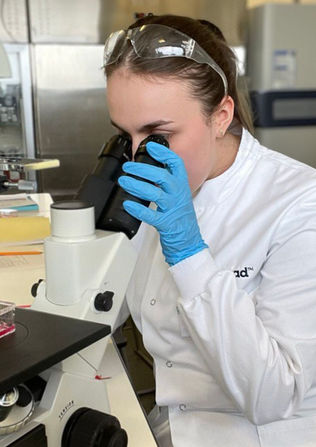Introduction
The course provides an opportunity for learners to acquire and/or improve their skills and knowledge of various aspects of mammalian cell culture.
Introduction
Throughout the course, emphasis will be placed on hands-on laboratory experience, theoretical understanding, and the development of essential skills for cell culture and biomanufacturing.
Participants will also familiarise themselves with specialist language and ethical considerations in the field.
What to Expect
This bootcamp runs from 9am-4pm for 10 days with an hour break for Lunch. Students are expected to complete 60 Guided Learning hours over the course of the 10 days before they can receive their certificate of completion. Throughout the bootcamp, learners are assessed and get personalised feedback from the lecturers to help participants improve on their current practices. Furthermore, lecturers emphasize the importance of maintaining a professional lab book, which ensures meticulous documentation of all scientific endeavours.

Who Should Attend
This course is ideal for:
-
Undergraduate students who are interested in acquiring cell culture techniques for use in their projects.
-
Postgraduate students who would like to learn cell culture techniques or improve upon their current knowledge about cell culture.
-
Adults who have had a career break from science and would like to apply for cell culture related jobs.
-
Adults currently working in academia or industry who would like to refine and update their cell culture knowledge and skills.
Course Content
This bootcamp is a perfect blend of theoretical and hands-on practical sessions. All practical sessions are usually a follow on of topics that are comprehensively taught during the theoretical sessions.
The theoretical sessions include the following:
-
Cell culture workflow
-
Contamination and contamination control
-
Cryopreservation
-
Introduction to Stem cells
-
Monoclonal antibody production
-
Regulatory and Ethical considerations in biological manufacturing
-
SOP writing to enable learners write and edit SOPs independently while performing their roles.
-
Journal club: Leaners critique a cell culture related journal article, thereby acquiring a critical skill- journal critiquing and reviewing; needed for their various research careers.
For the practical sessions, participants are taught health and safety in the laboratory, practice aseptic techniques and perform the following:
-
Sterile media preparation
-
Resuscitation of cells
-
Cell Passaging
-
Cell count and density calculations
-
Cryopreservation of cells
-
Mycoplasma PCR testing
-
Isolation of peripheral mononuclear blood cells (PBMCs) using density centrifugation
-
Proliferation assay
-
Colony forming unit (CFU) assay
-
Brightfield and Inverted microscopy
On the last day, students attend our Advice, information and Guidance (AIG) session where they receive advice and guidance on how to write professional CVs that will give them better chances of getting into employment. Students also receive useful information on how to conduct themselves during job interviews.
Furthermore, participants present an aspect of science that they are passionate about. They will get constructive feedback from the lecturers which they can take on board for their future scientific presentations.
Outcomes
By the end of the course, participants will be confident using a wide range of techniques standard in contemporary biological research and industrial laboratories.
Those who apply the guidance provided in the AIG session will be in a stronger position to secure job interviews and succeed in scientific roles. Course lecturers also endorse key skills on LinkedIn to help learners stand out to employers.

Support After Completion
BioGrad continues to support learners long after the course ends:
-
Student records including references and practical work photos are securely stored for three years
-
The Student Liaison Team remains in contact to assist with job applications and interview advice
-
Course lecturers offer mock interview practice for up to six months after completion
-
BioGrad has partnered with Reed Scientific to connect students with employment opportunities in scientific and laboratory-based roles








